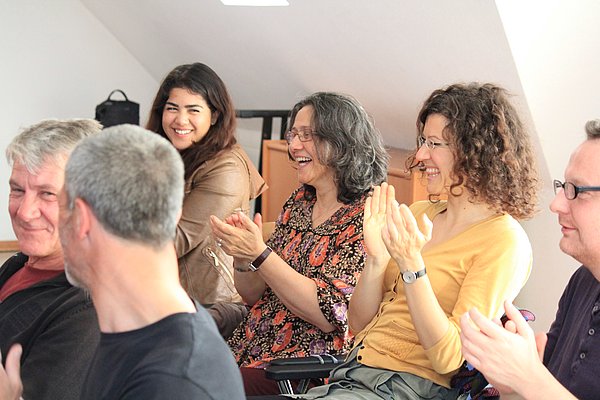
Natalia (links) bei einer Aufführung des Theaters der Erfahrungen
Natalia GuiterrezNatalia
from Mexico studied Social Work at ASH Berlin and did her internship at Theater der Erfahrungen.
How did you like it at ASH Berlin?
I really liked it; the educational system in Germany is completely different than the Mexican one. I could not say that it is better or worse but for sure it was a remarkable experience.
Did you experience any differences between the educational system of the two countries?
Honestly, I had a lot of preconceptions about German education, I thought that it would be extremely strict and demanding – an “inside the box” way of thinking. But it was the opposite. The teachers were really open to discussion and the rules of the class were not hard to follow. Mexican education is strict. You can only miss ten percent of your lessons each semester and in almost every class you have an assignment, teamwork or reading to do. Also, the career of social work at the UNAM (my home university) is half practice and half theory. Beginning in the third semester, you have to have internships in different social work fields. Why is Mexican education so traditional and strict? Well, my conclusion was that sometimes we “need” some authority to tell us exactly what to do and when to do it. We are used to having those demands. Which makes it harder for us to learn how to be proactive.
What else is different?
Social work is different in every country because the social reality varies in each context and environment. For example, here the internships are focused on the problems or areas in which Germany has needs, whereas in Mexico the problems are completely different. In my field, which is elderly people, the poverty rate in Mexico is 60 % and in Germany it is only a fifth of that. Therefore, the way social work is practiced is different and the style of teaching also varies.
You did an internship at Theater der Erfahrungen, a senior citizen theater group. What did you do there?
Firstly I had a phase of inclusion. I attended almost every rehearsal to learn about the work, the goals and methods of the theater. Then I started to help with the practical needs of the everyday functions. Then I started to get more involved with some groups and to participate more actively as a social worker. Also, the theater was kind enough to let me do my thesis research about the organization, so I also did that.
What did you like most at the internship?
As a Mexican? To see how this organization works and how the theater is such an important part of the elders’ lives was priceless. Also, I felt part of it. I was for a moment one of them, making things happen. That was something I will never forget.
Did you miss anything?
I am sure I could have done more to improve my German. I hope to come back someday being able to communicate fully with the staff of the theater and with the elders.
You are writing your bachelor thesis about the theater project. What is it about?
Well, as I was doing my internship I found out that the staff of the theater is composed of theater pedagogues and social workers. It is an interdisciplinary work. And it works! So my research is about that. How these two professions complement each other, and also, I am systematizing its methodology.
Which experiences did you take back to Mexico?
First, the opportunity to work with a German organization. Second, my everyday life in a country completely different from mine. Third, the amazing people I got to meet. And lastly, I found out that I am proud to be Mexican and to be an ambassador of my country and my university.
How important is international exchange for you?
Definitely a life-changing experience that every student musth have.
How did you like Berlin?
I loved it. But mostly I loved the vibe and their people.
How about your contact with Berlin people?
At the beginning, I only met international people at the university. Then, I contacted the Church in Berlin and it was my first encounter with local Germans. They invited me to their homes; I really enjoyed that. The second semester was completely different, I was more used to the city and my language skills got better, so I started to socialize more with locals. Also, the internship really helped. I just want to thank Theater der Erfahrungen for the opportunity and the international office for taking such good care of the international students.


